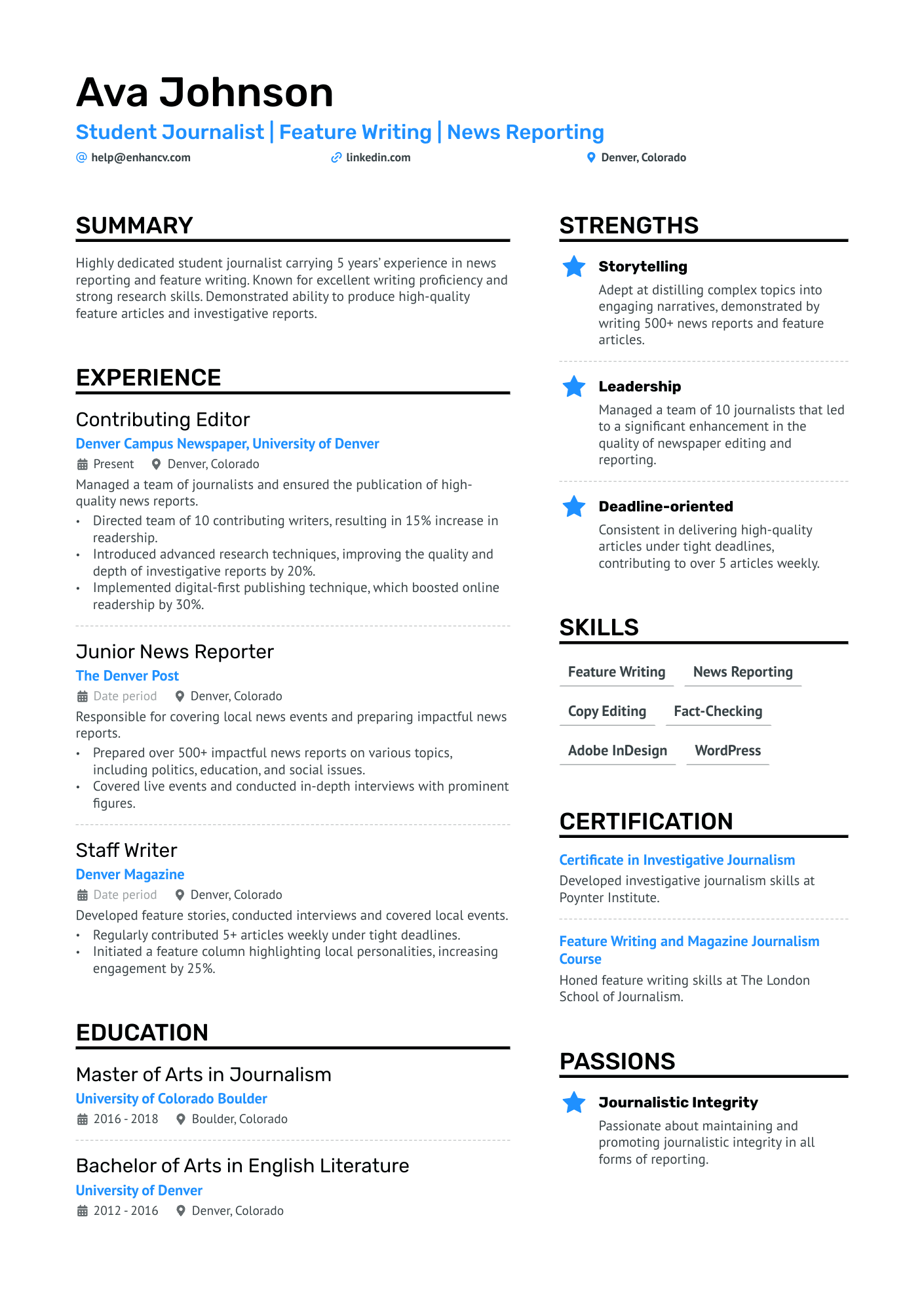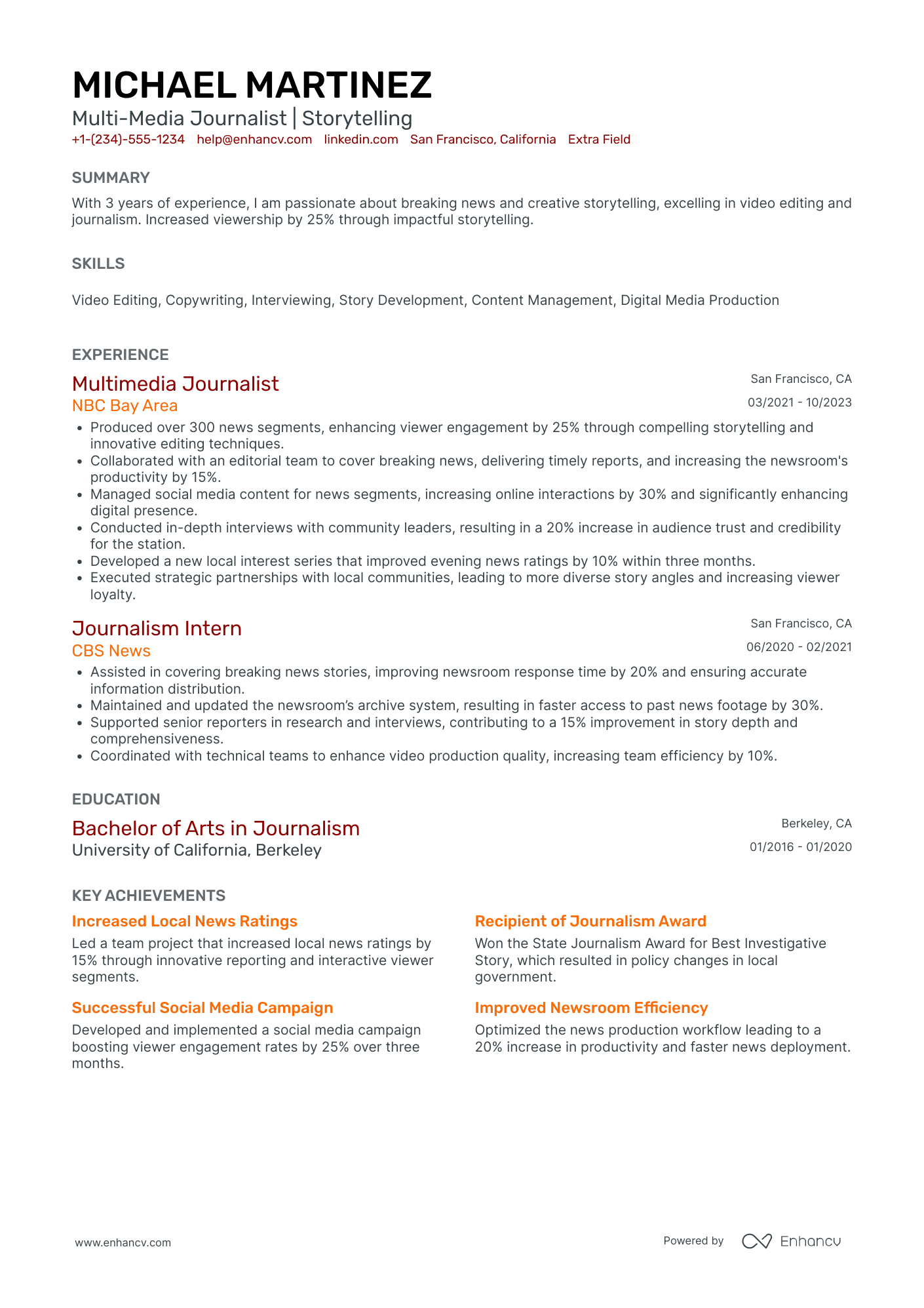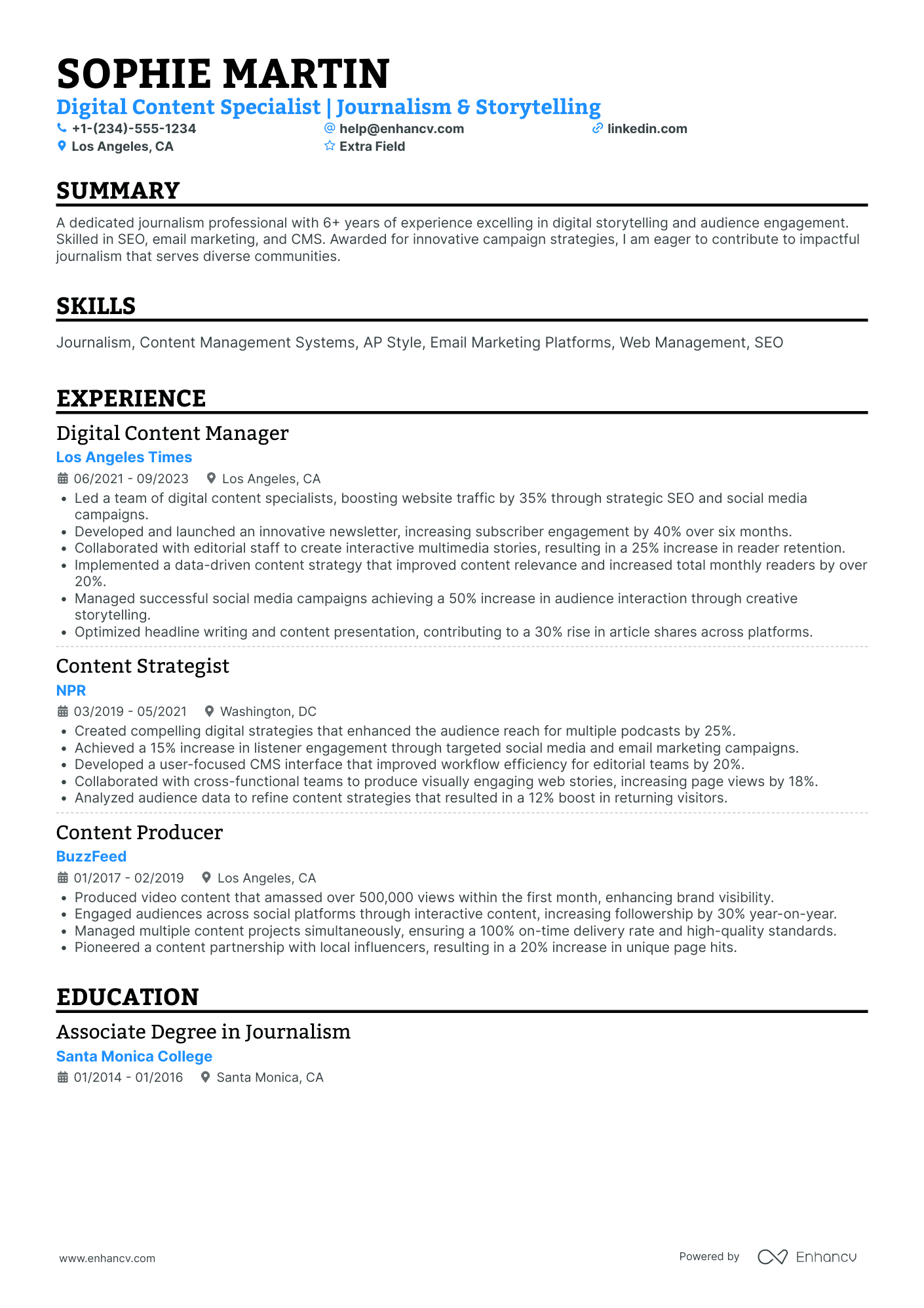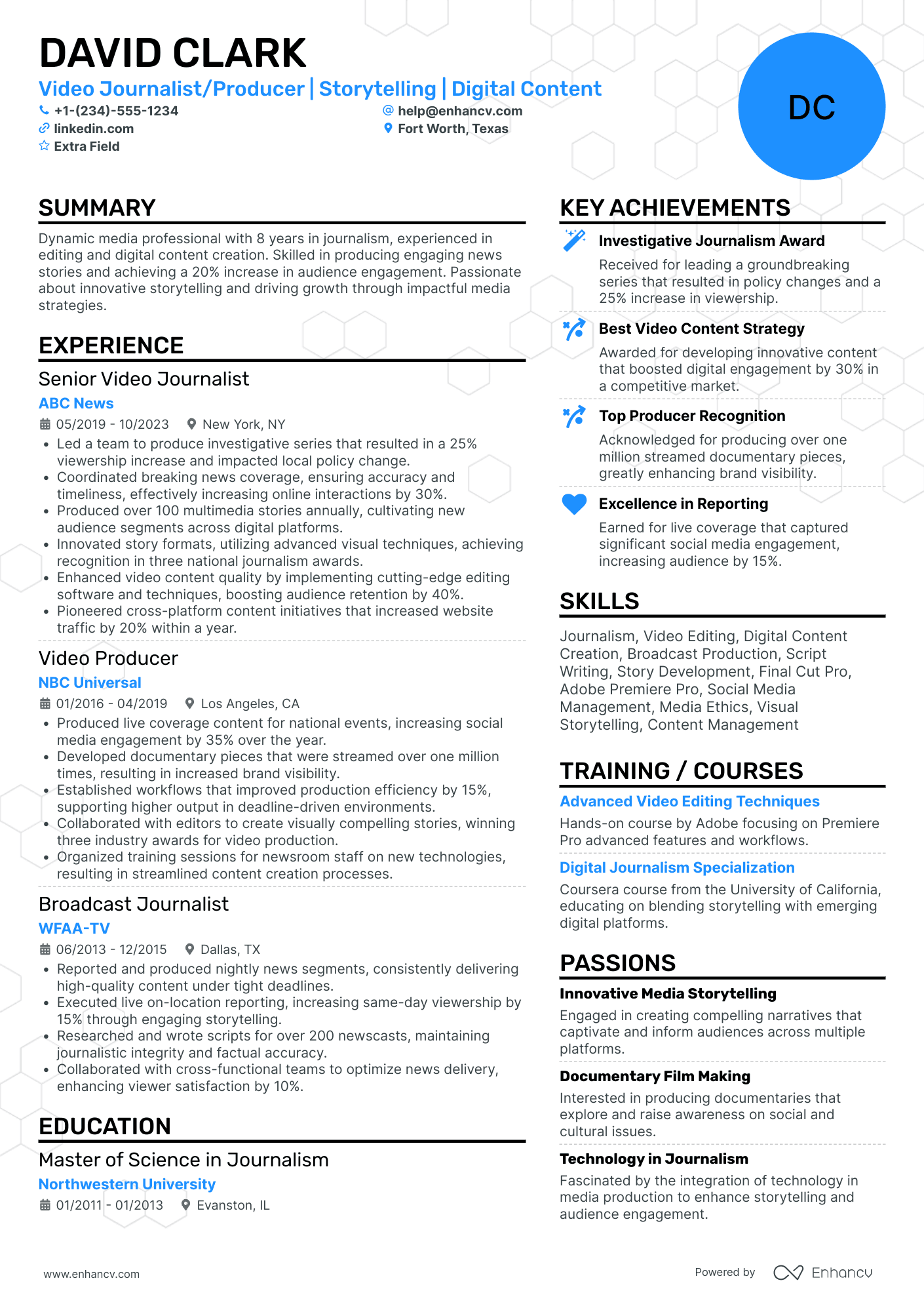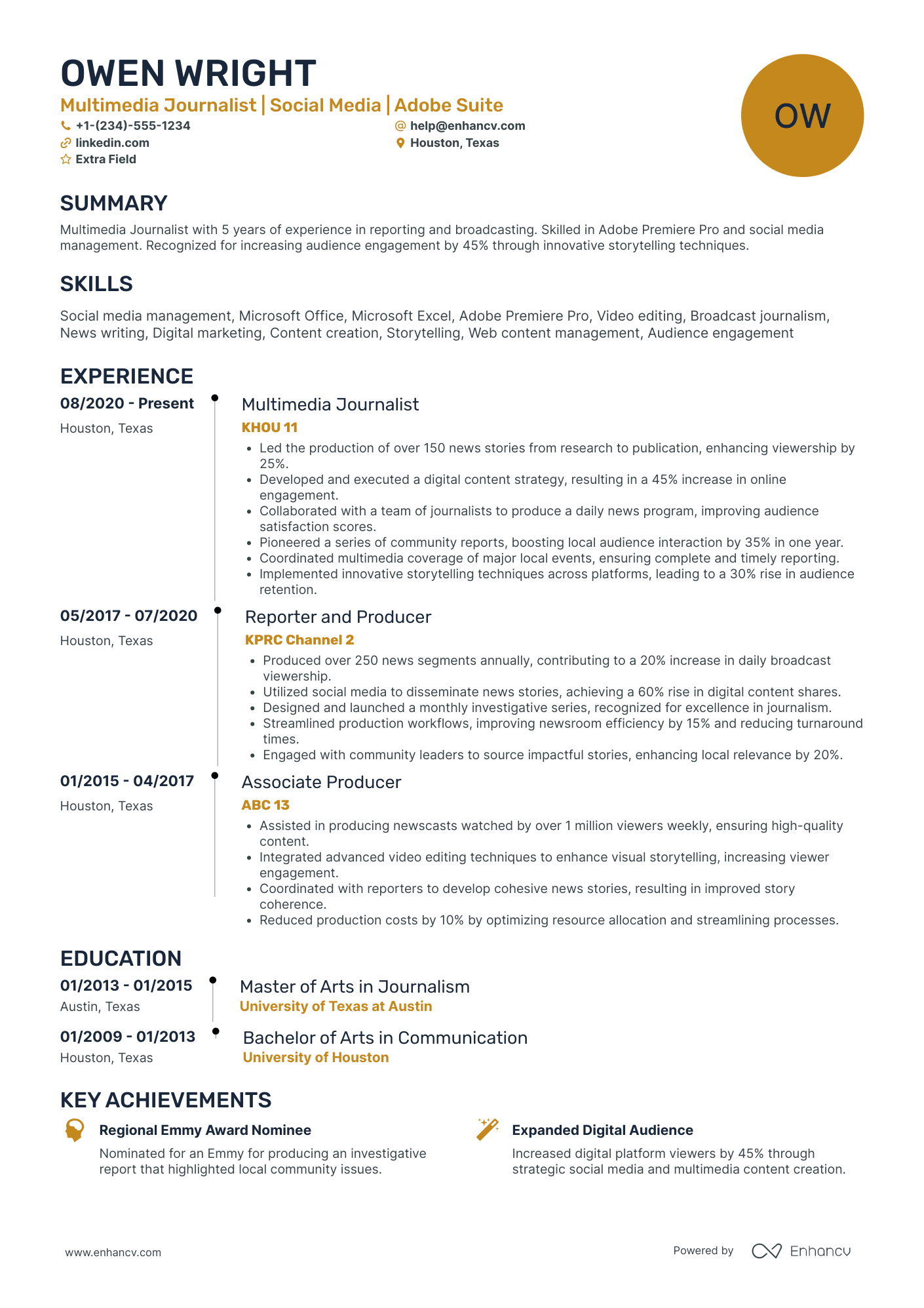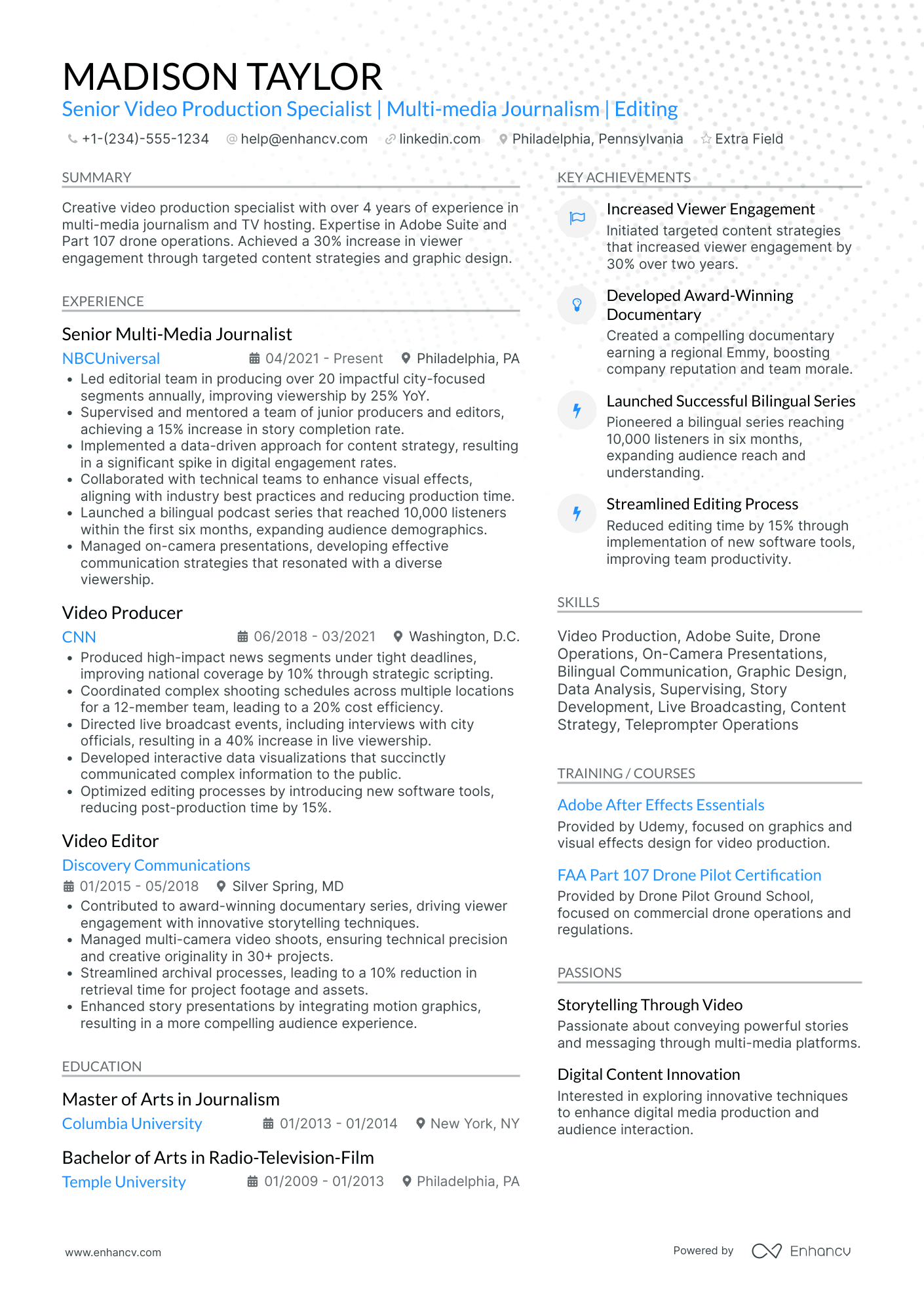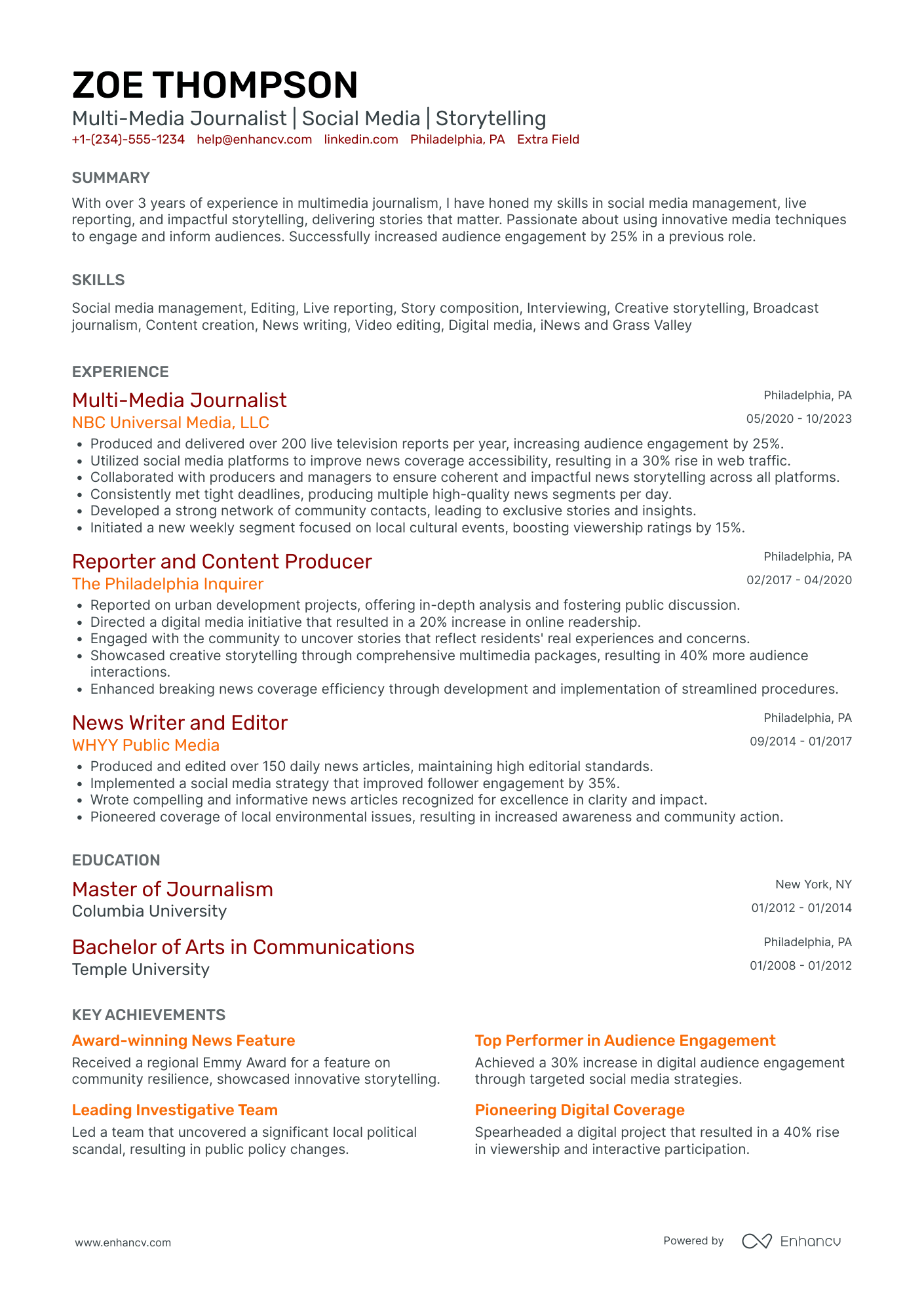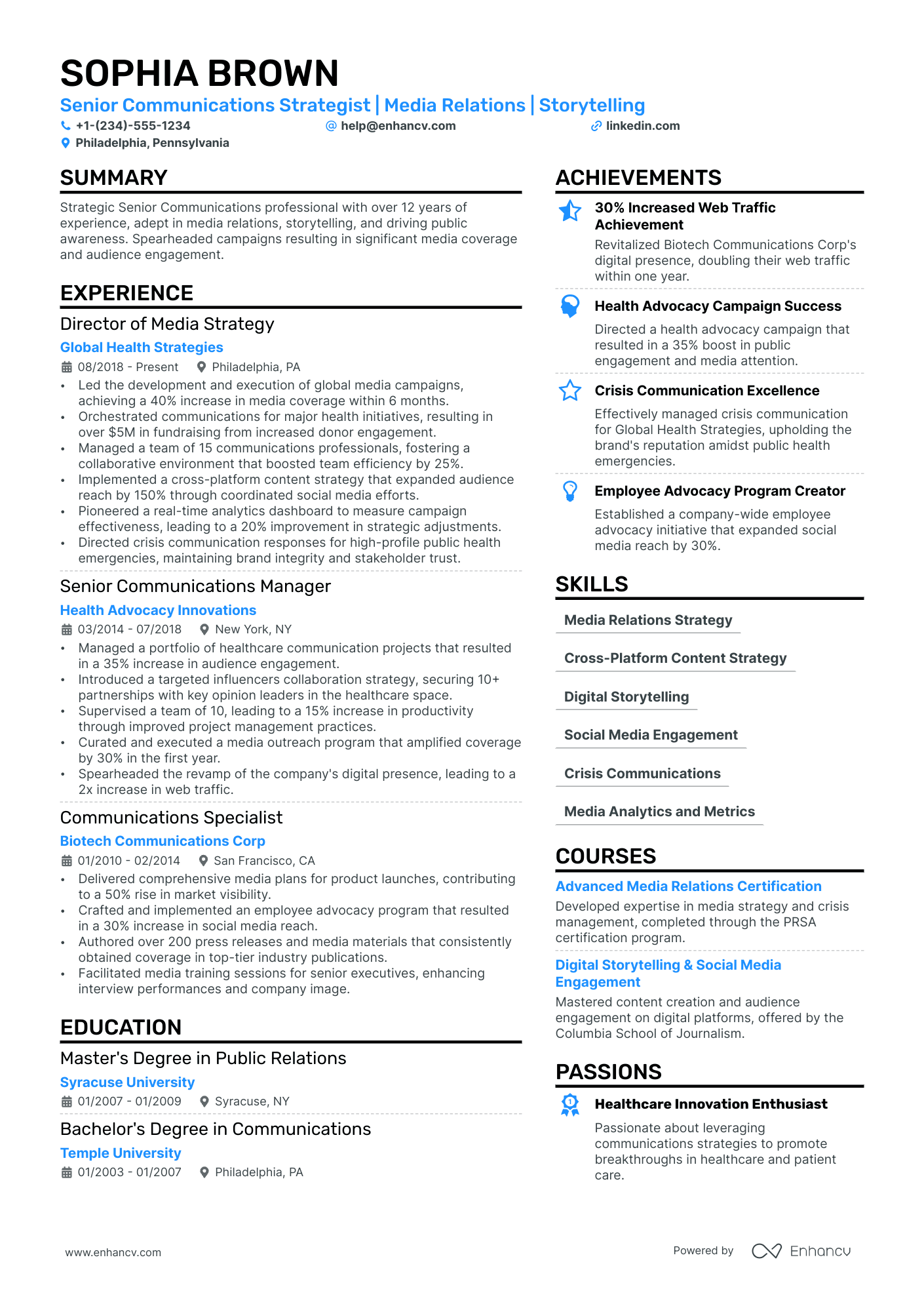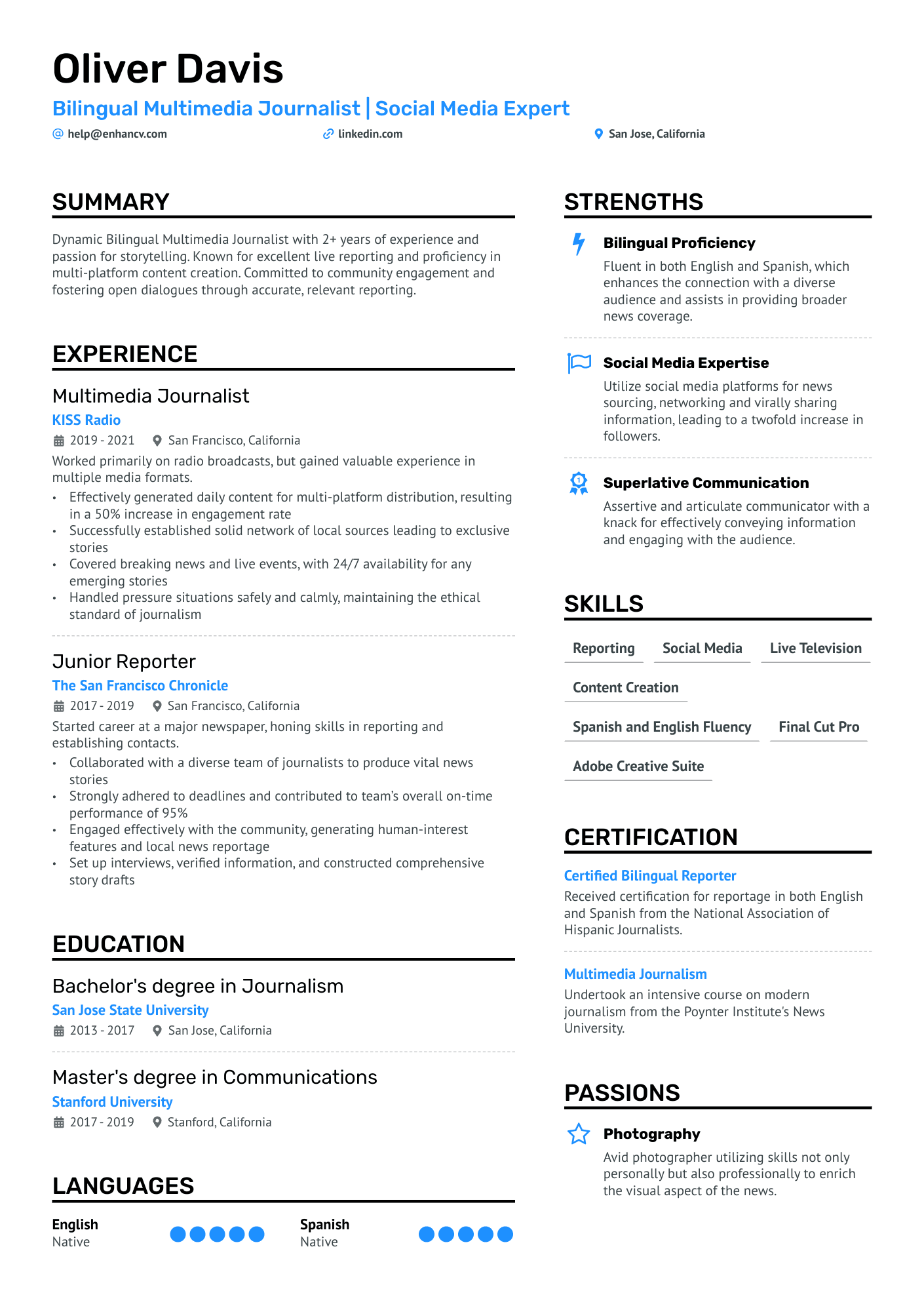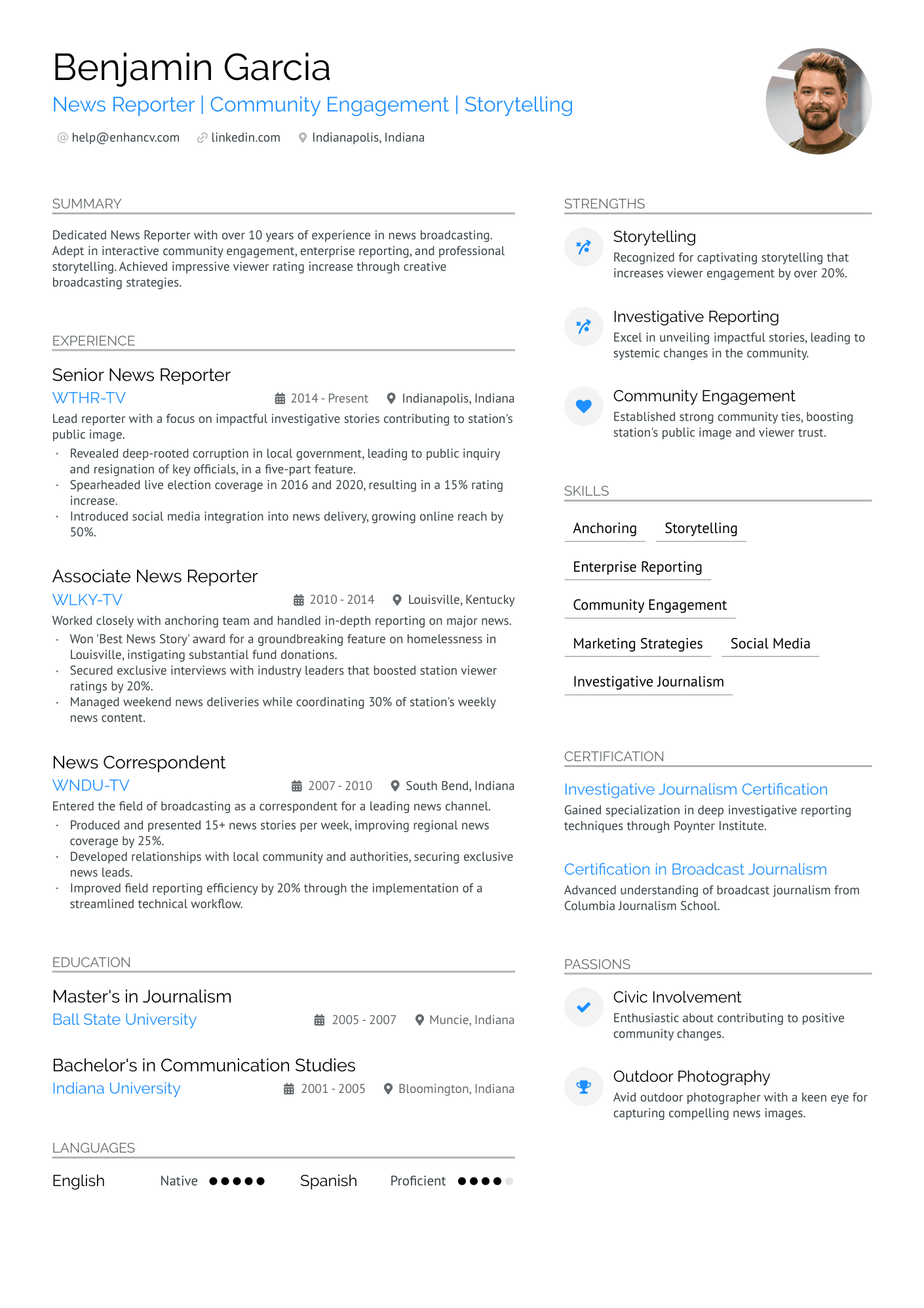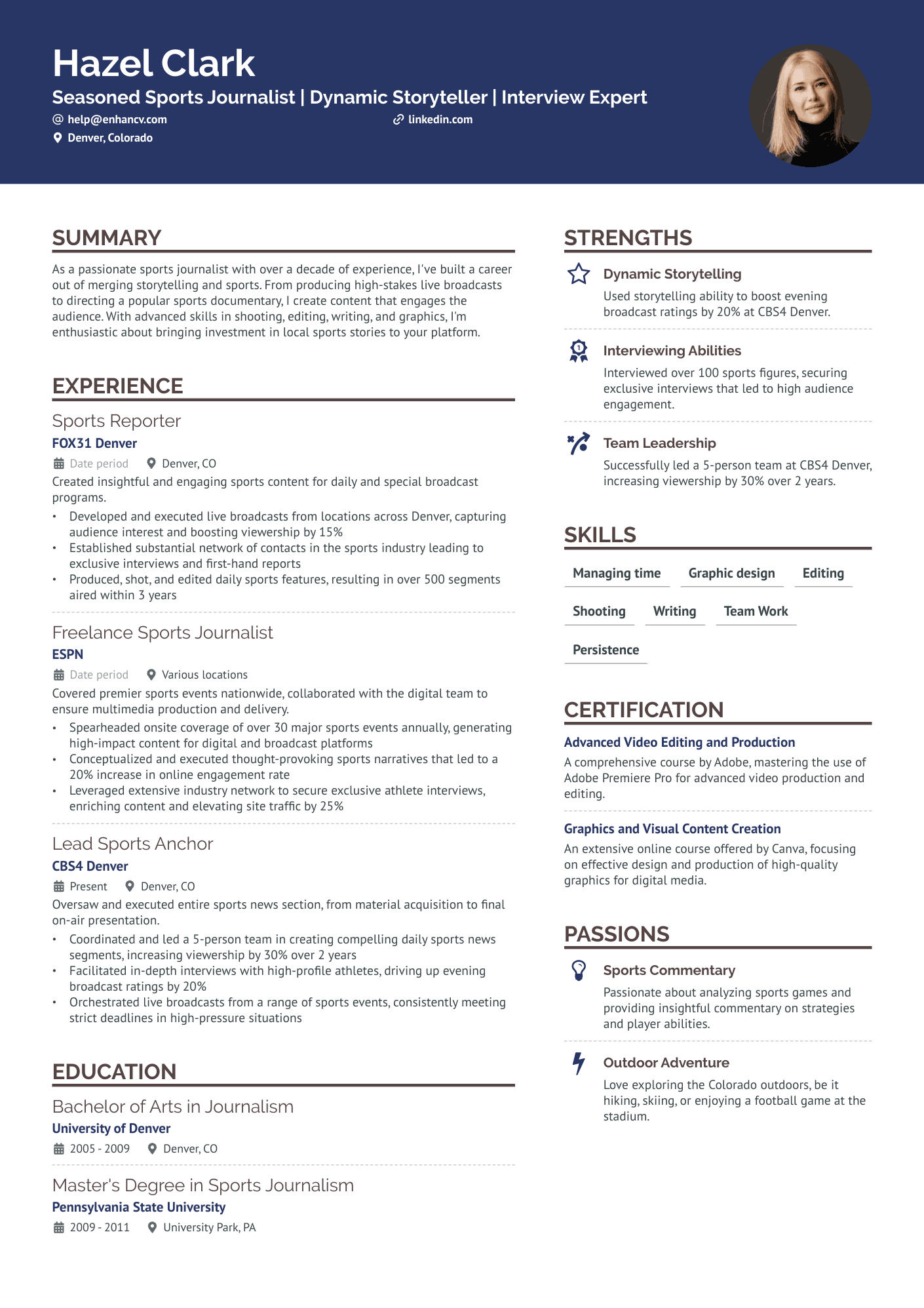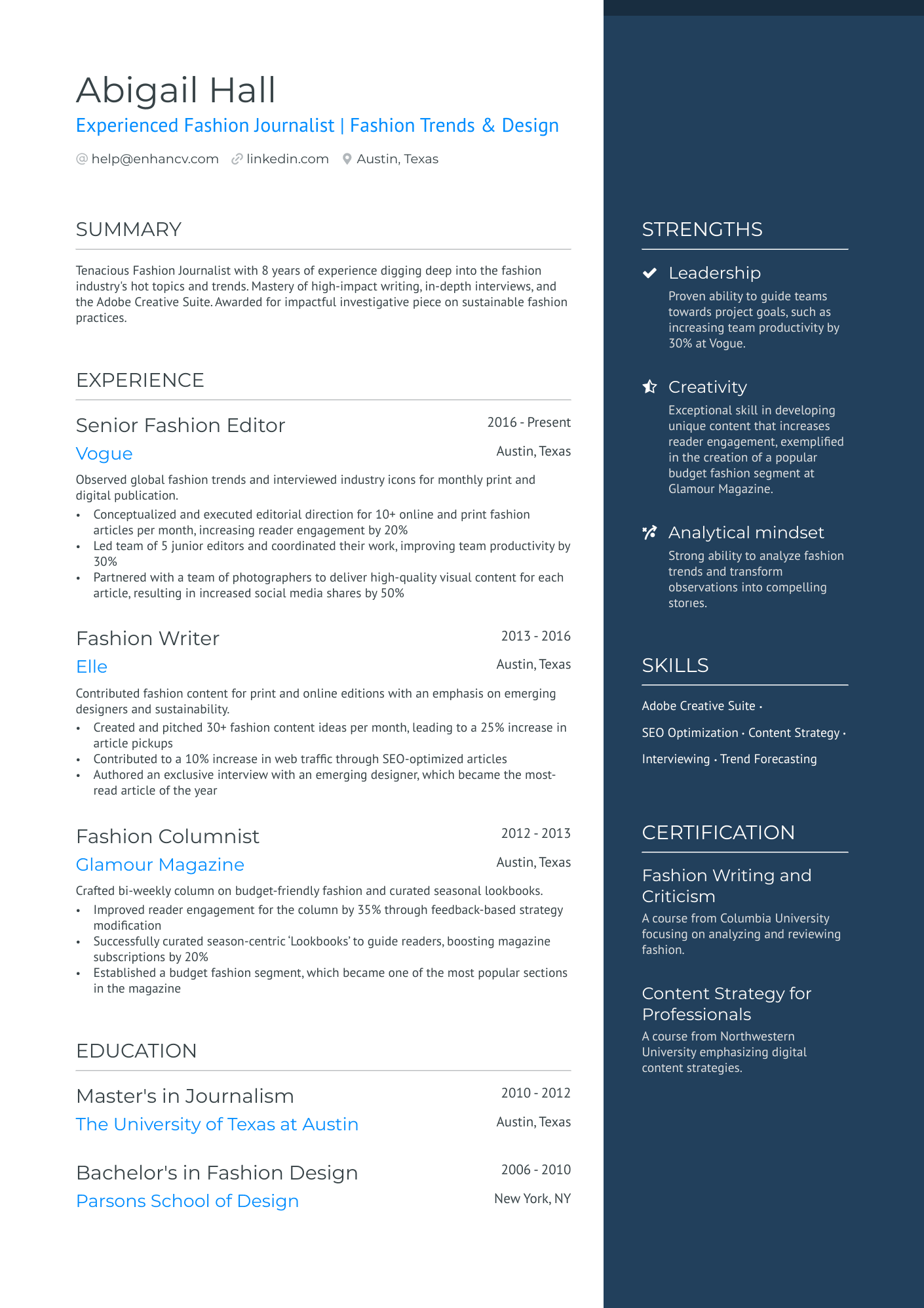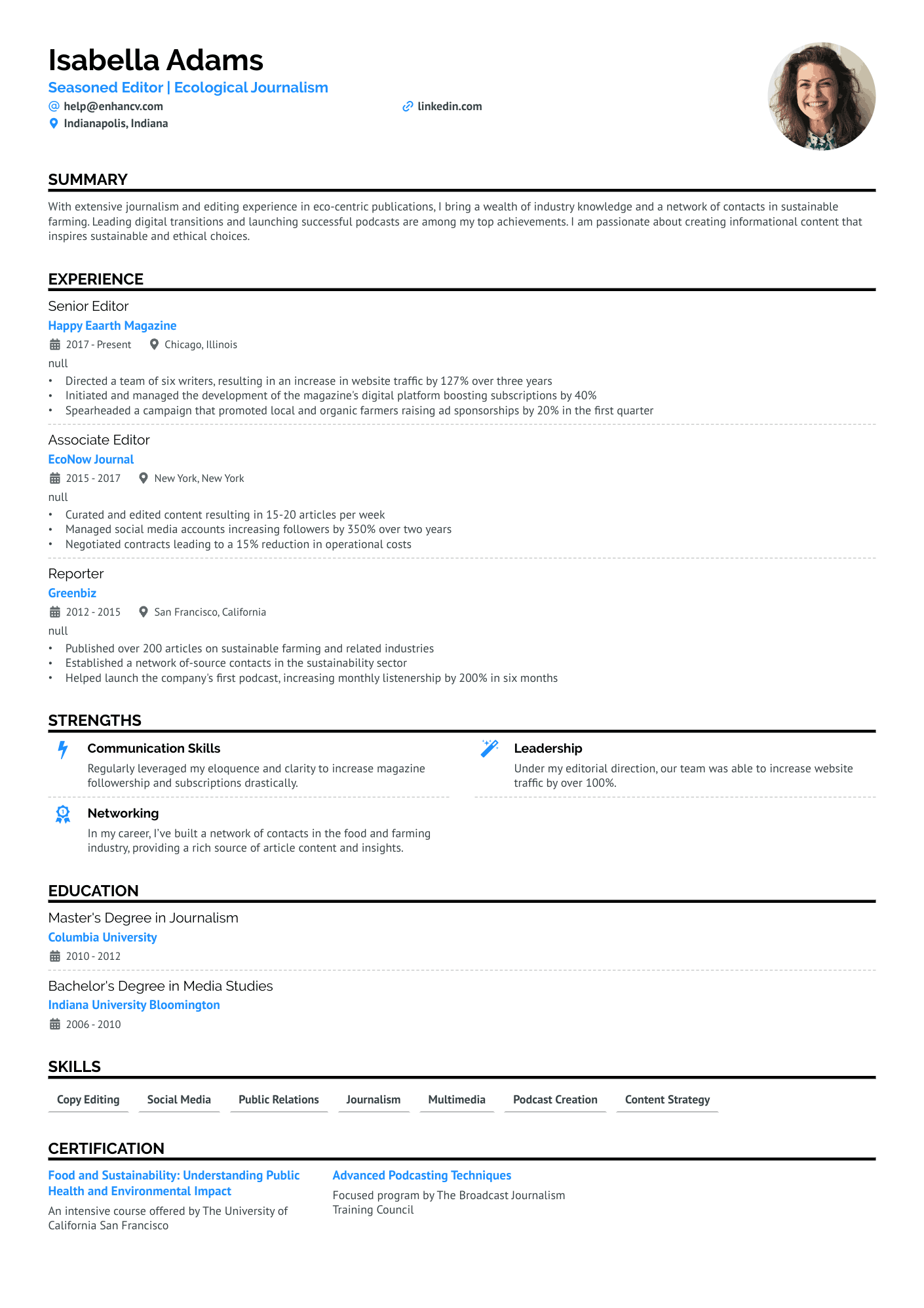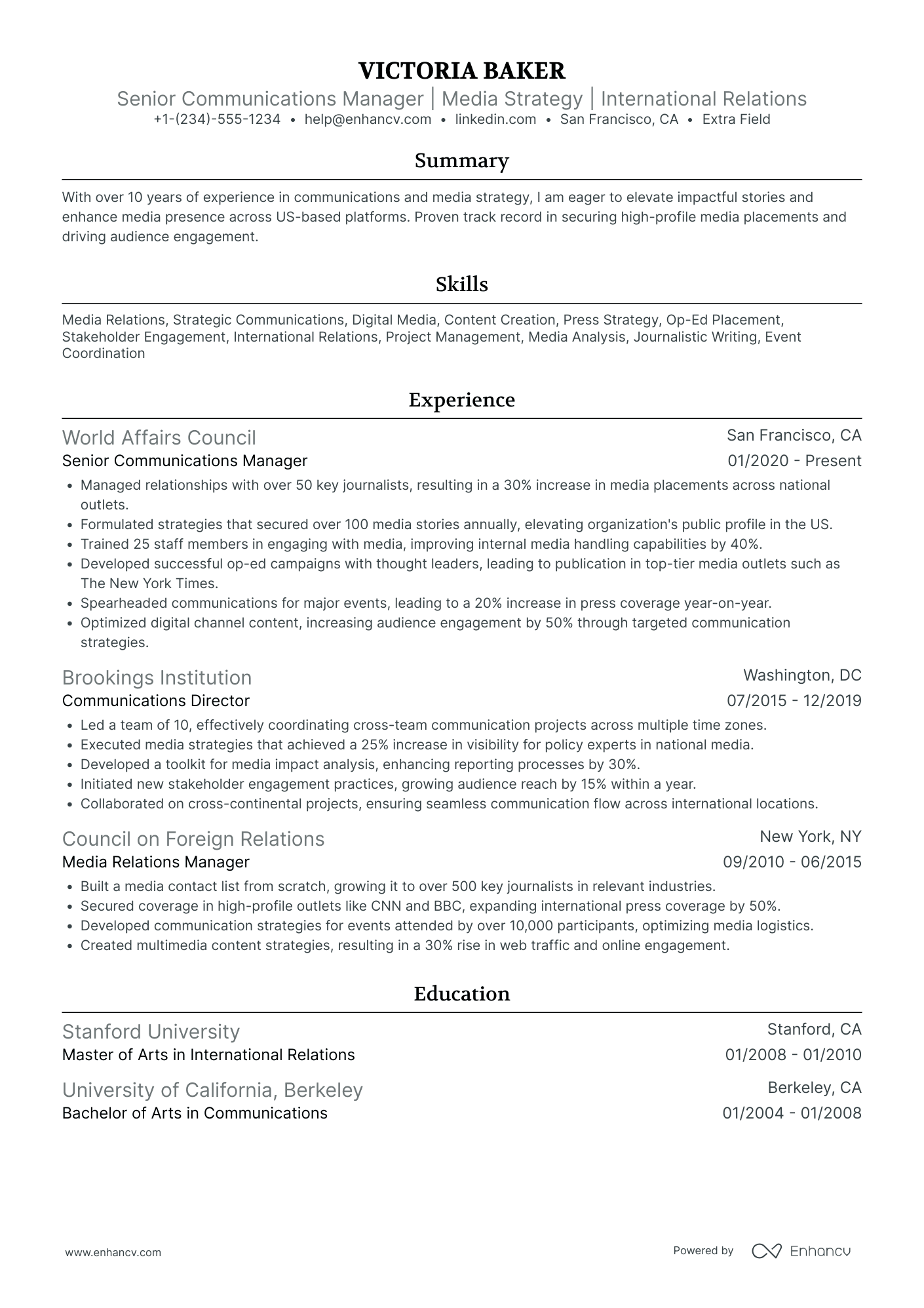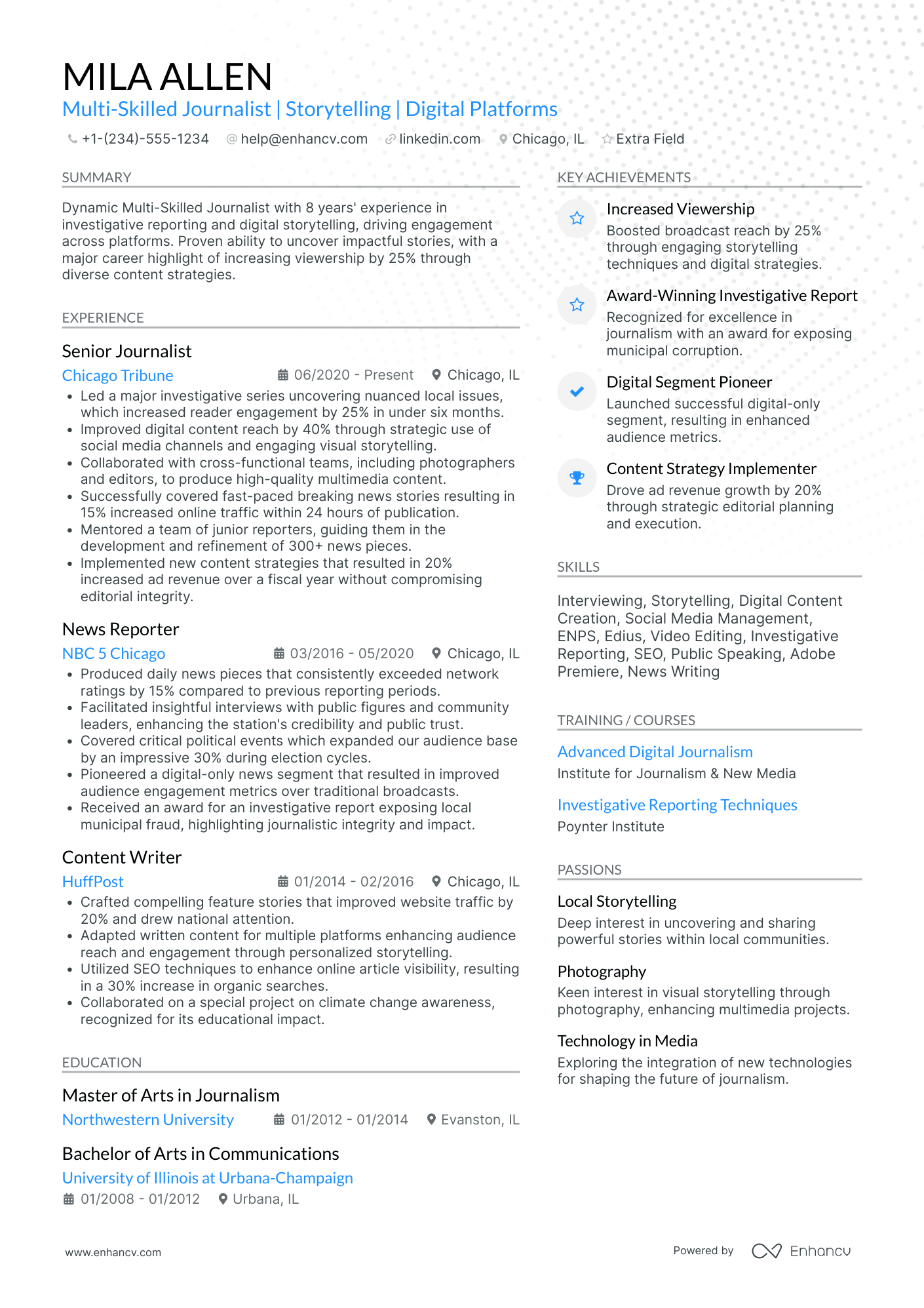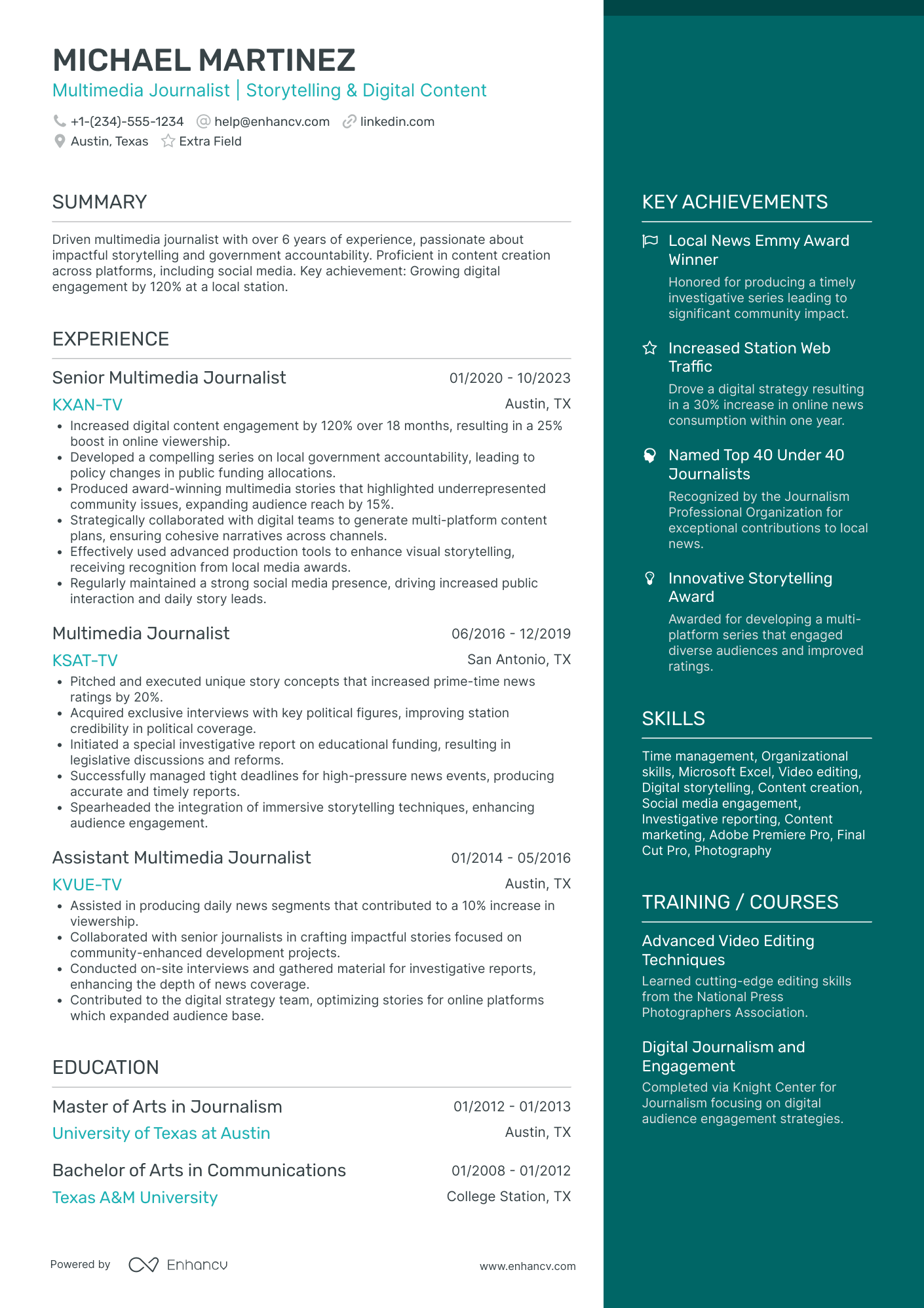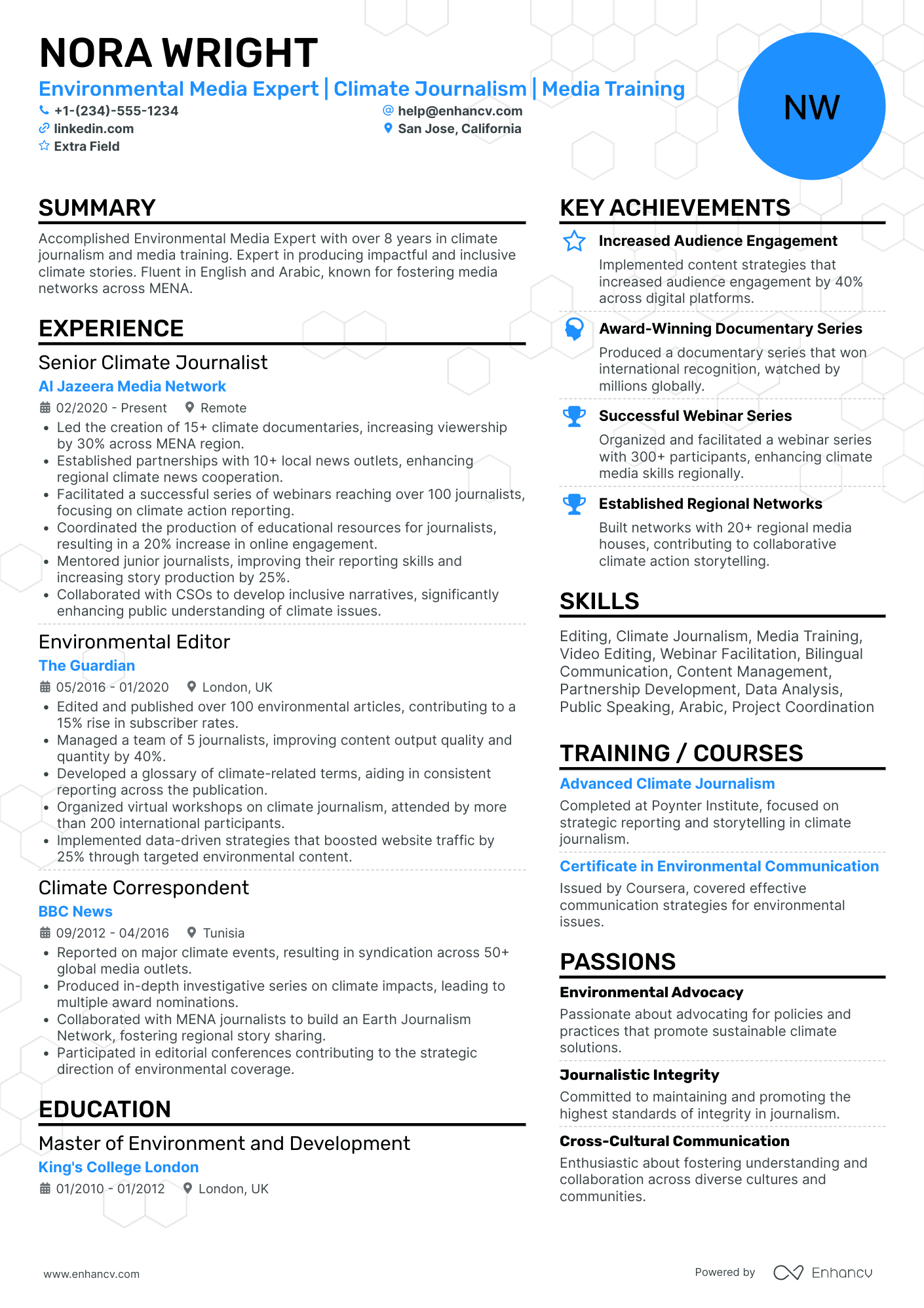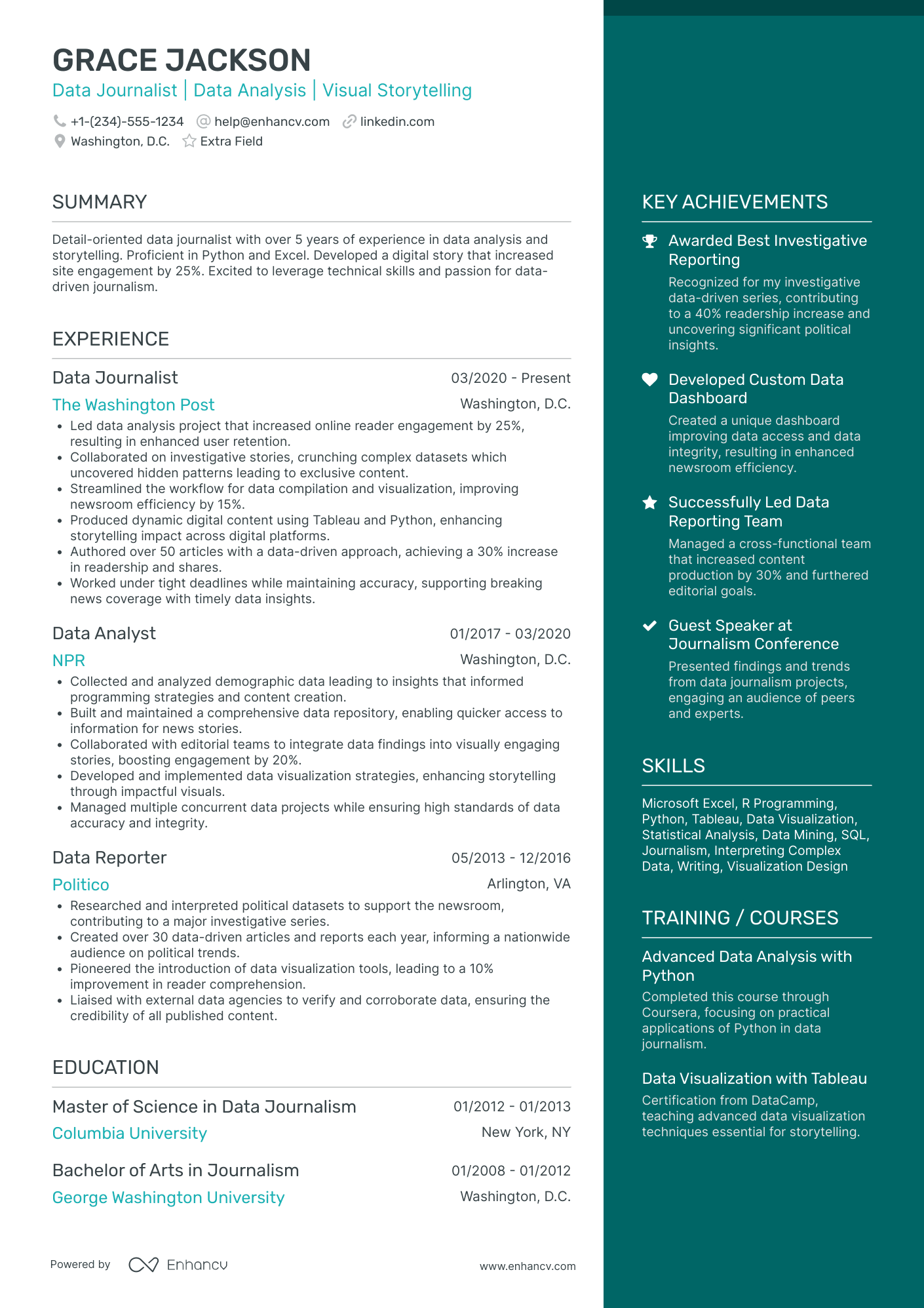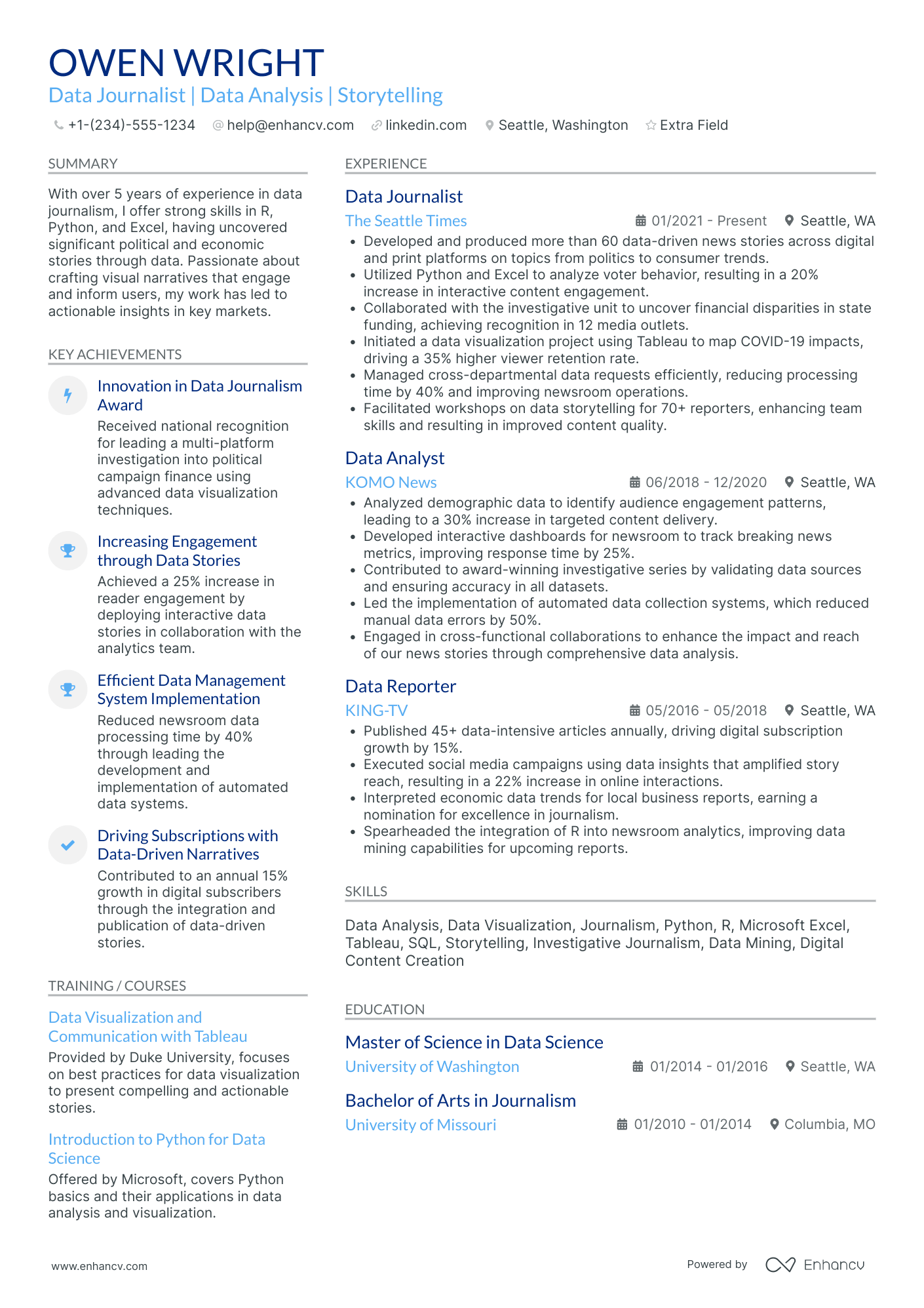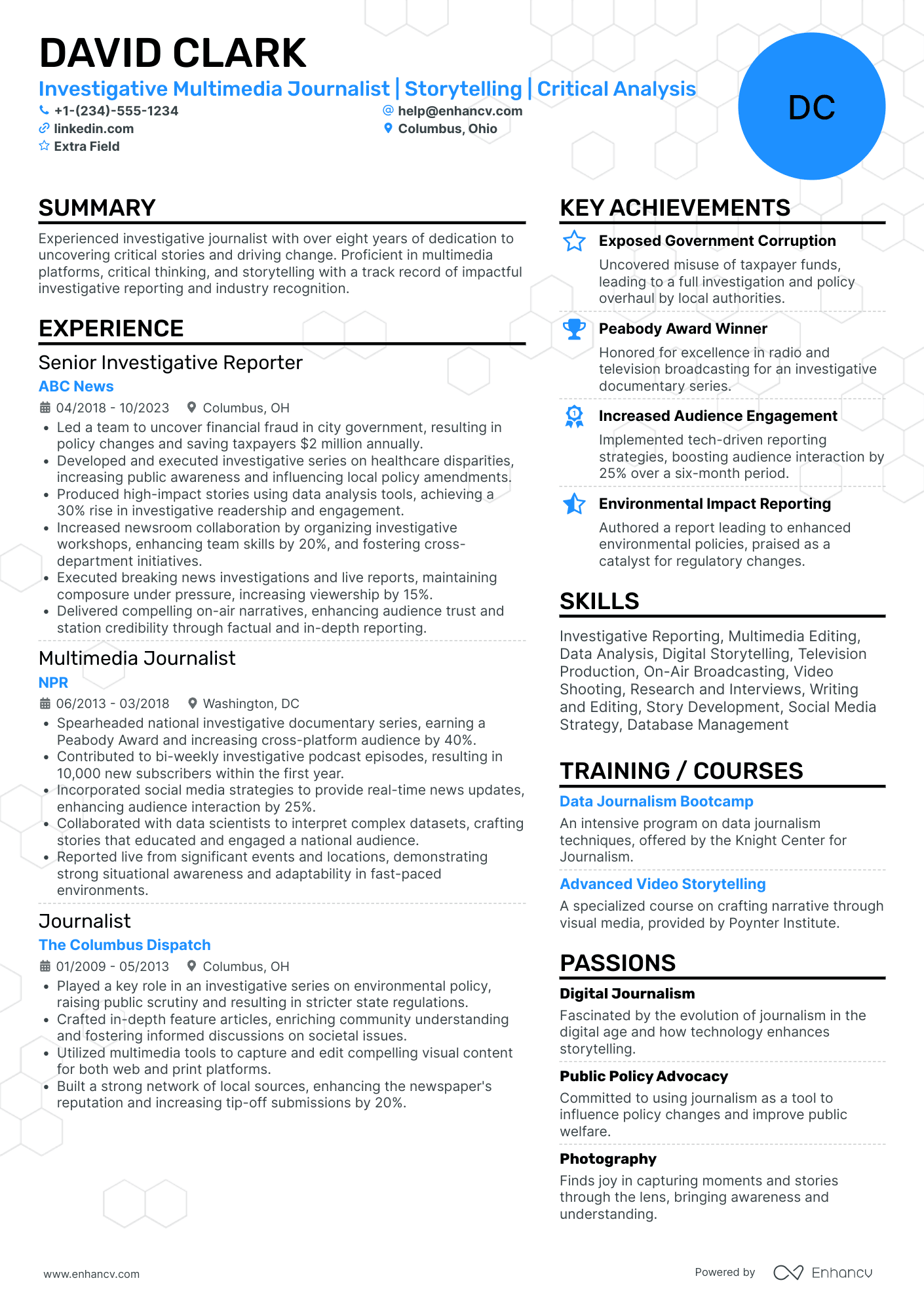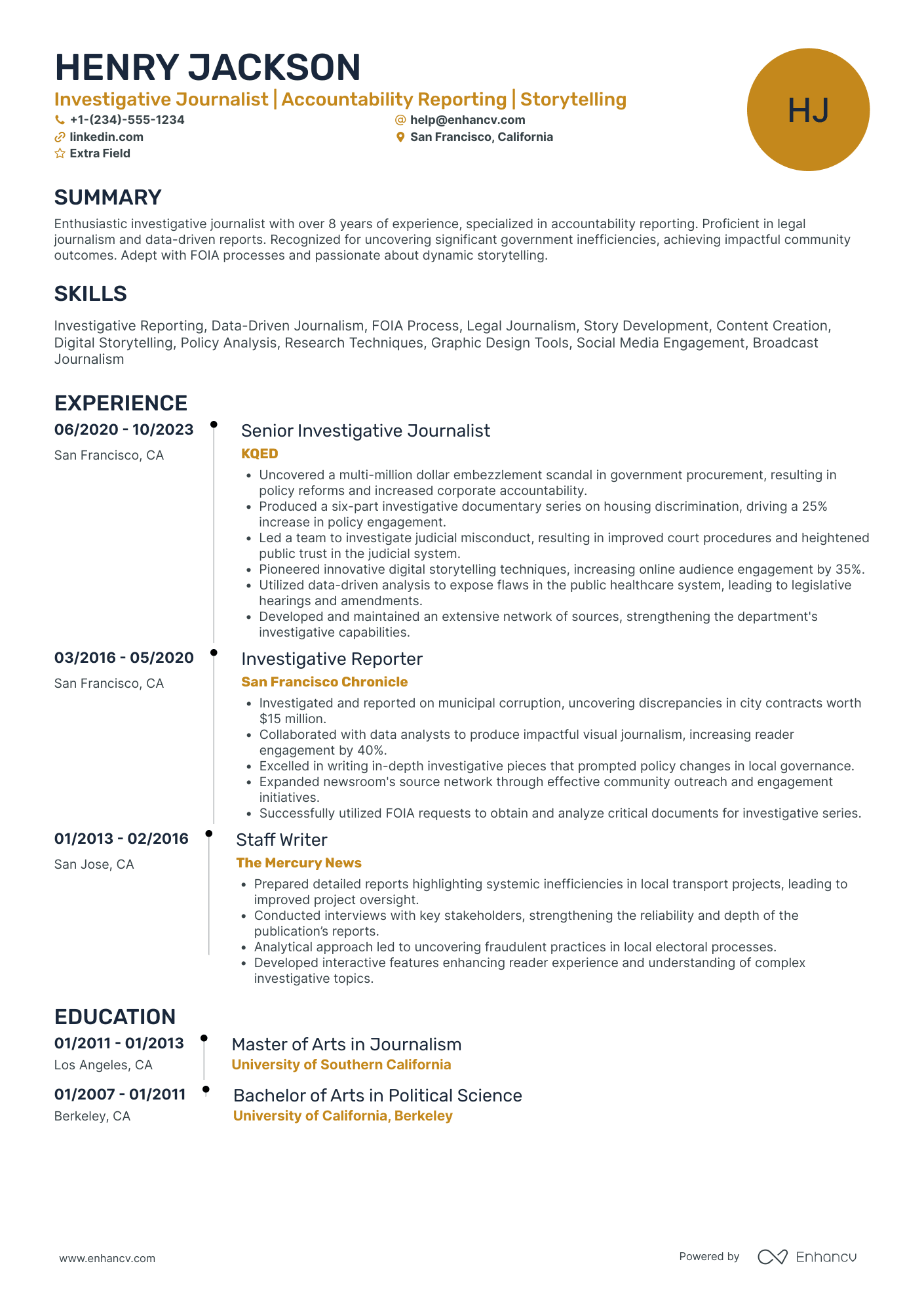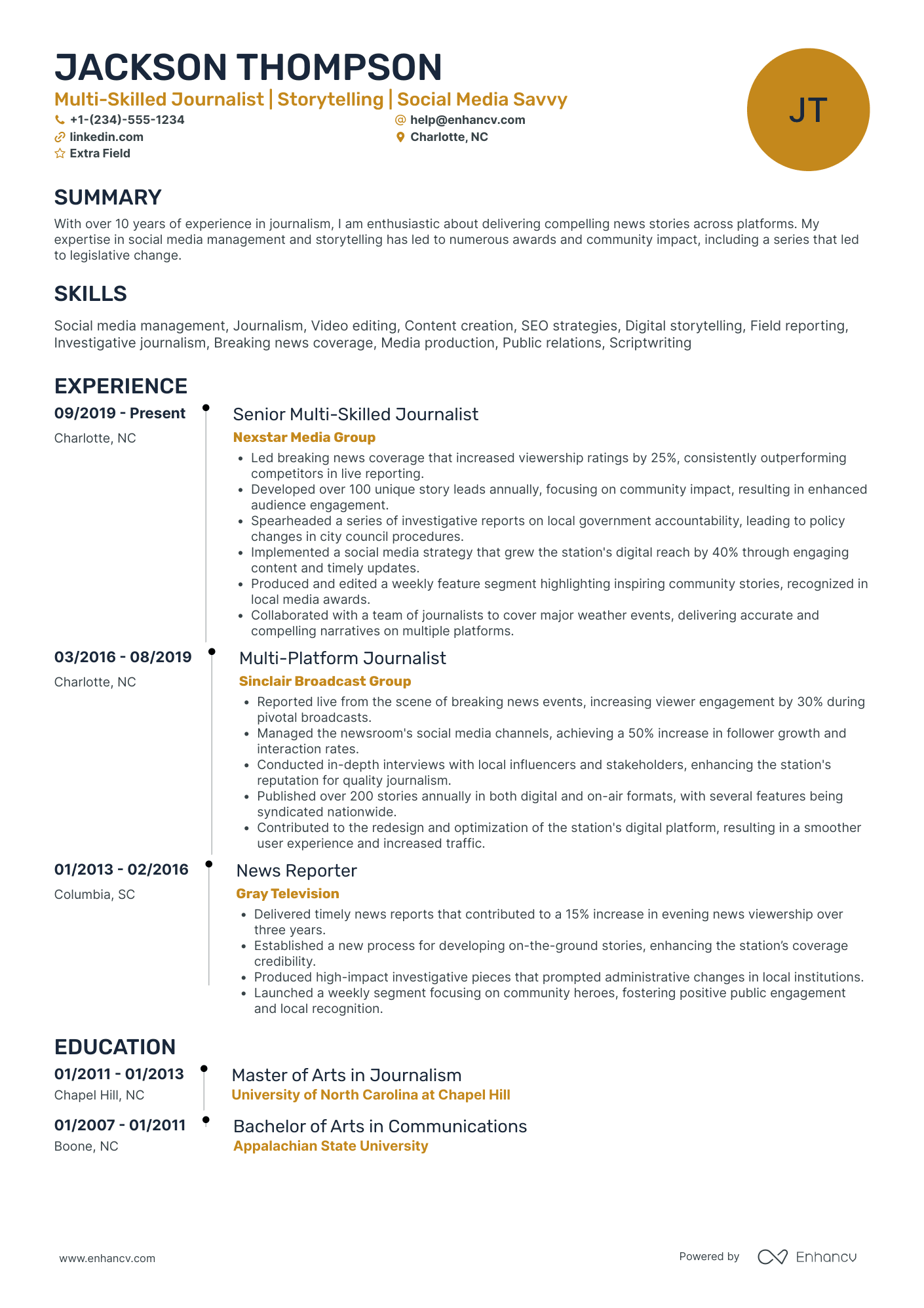As a journalist, you strive to deliver accurate stories that resonate with your audience. The job involves tight deadlines, low pay, and grueling schedules, especially in broadcasting with overnight and holiday shifts.
But these experiences shape the most determined and resilient journalists. This guide will help you build a journalist resume that shows your bylines and makes it clear to media recruiters how good you are at your job.
Here’s a quick overview of what we’ll cover in this guide:
Key takeaways
- Organize your work history and career progression as a journalist in reverse chronological order.
- Craft a compelling resume summary that highlights your key qualifications, journalistic style, and significant achievements.
- Underline both your technical skills, such as proficiency with content management systems and multimedia tools, as well as your strong writing, editing, and communication abilities.
- Show the impact of your work by citing specific metrics, like increased readership, engagement rates, or successful investigative pieces.
- Tailor your resume for each position by aligning your skills and experiences with the specific requirements of the journalism role.
- Include details about your education and any relevant certifications or training to demonstrate your expertise in the field.
- If you’re short on professional experience, focus on internships, freelance work, or personal projects that showcase your journalism skills.
Building a strong resume is vital for journalists. Let’s explore the best format to emphasize your writing talent and professional experience.
Journalist resume sample
Take a look at this journalist's resume example to inspire your own.
Alex Morgan
Reporter
help@enhancv.com | @linkedin.com | Los Angeles, California
Summary
Experienced reporter with over 7 years in breaking news operations, specializing in uncovering exclusive stories and delivering them in a compelling, vibrant style. Adept at working independently, with a strong network of contacts across California, and a proven ability to turn local stories into national news. Skilled in navigating legal documents, conducting on-the-scene reporting, and meeting tight deadlines in fast-paced environments.
Experience
Senior Reporter
Los Angeles Times, Los Angeles, CA
January 2019 – Present
- Uncover exclusive stories, driving a 15% increase in online readership through innovative reporting.
- Develop and maintain a strong network of sources across Los Angeles, enhancing access to breaking news.
- Provide on-the-scene reporting for major events, boosting site traffic by 20% with timely coverage.
- Collaborate with editorial teams to brainstorm and refine story ideas, increasing engagement by 10%.
- Navigate complex court documents, simplifying details for a broad audience while maintaining accuracy.
Breaking News Reporter
NBC News, Los Angeles, CA
March 2015 – December 2018
- Covered breaking news stories, contributing to a 25% growth in real-time online engagement.
- Worked closely with producers and editors to deliver content that met both editorial standards and audience expectations.
- Reworked local stories into national news angles, increasing visibility and reach by 30%.
- Maintained high reporting standards under pressure, ensuring all content was accurate and timely.
- Traveled nationally for on-the-ground reporting, securing exclusive interviews for major news events.
Education
Bachelor of Arts in Journalism
University of Southern California, Los Angeles, CA
Graduated: 2012
Relevant Coursework
- Investigative Journalism: Emphasized in-depth reporting techniques and uncovering hidden stories.
- News Writing and Reporting: Developed advanced skills in crafting compelling news stories.
Certifications
- Digital Journalism Certification, Poynter Institute, 2019
- Court Reporting and Legal Document Navigation, California State University, 2017
Skills
- Investigative Reporting
- Breaking News Coverage
- Story Development
- Legal Document Analysis
- Digital Journalism
- On-the-Scene Reporting
Languages
- English (Fluent)
- Spanish (Intermediate)
Now that you've seen an example, let's find the best format for your journalist resume.
How to format a journalist resume
For journalists, using a reverse-chronological resume format is often the best approach. This layout emphasizes your latest work experience, making it easy for recruiters to trace your career development and the stories you've brought to life.
Here’s a suggested order for your resume sections:
- Header
- Summary/Objective
- Professional experience
- Education
- Certifications
- Skills
- Languages
With this structure in mind, let's look at some resume designs to help your application stand out.
Resume designs
- Stick to 1-inch margins for readability and use a two-column format for a sleek design.
- Select professional fonts like Rubik, Arial or Lato, sized between 10 and 12 points, and apply soft color touches to emphasize your skills.
- Keep the resume to one page if you have under 10 years of experience and expand to two pages for a more extensive career history.
Contact information
- Add your name, phone number, and professional email to the resume header.
- Match your job title to the journalism position you’re targeting, and consider a headline that underscores your specific storytelling skills.
- Include a link to your LinkedIn profile and a personal portfolio to demonstrate your professional network and achievements.
- Skip the photo to keep the attention on your qualifications and experience and reduce the chance of bias.
File format
- Name your resume file clearly, for instance, "AlexMorganjournalistResume.pdf."
- Always save it as a PDF unless the job listing asks for another format.
Your resume should match the market – Canadian applications, for instance, may use a different layout.
Take advantage of our free AI-powered resume checker to optimize your document for applicant tracking systems.
Is your resume good enough?
Drop your resume here or choose a file. PDF & DOCX only. Max 2MB file size.
Now that we’ve taken care of the details, let’s turn to the highlight of your resume: your work experience.
How to write your journalist resume experience
Getting the experience section of your resume just right is important for journalists because it shows the difference your reporting has made. Simply listing your tasks isn’t enough.
Instead, customize your resume to match the journalism job you’re aiming for. Identify where your experience aligns with the publication’s needs, and emphasize those points to your advantage.
The right way to tailor your journalist resume to the job description
When you tailor your resume to fit the journalism job description, you ensure your top qualifications shine. This approach helps you grab the hiring manager's attention. By prioritizing the skills and experiences that the publication values, you clearly demonstrate why you’re the ideal candidate. This is known as a targeted resume.
Let’s take a look at this journalism job offer to customize our work experience section.
Multimedia journalist
Job description:
The multimedia journalist at Starnes Media will create and manage digital content for six community publications, capturing photos and videos for print and digital platforms. They ensure content meets quality standards, deadlines, and key metrics while collaborating with the team to support the company’s vision.
Responsibilities:
- Produce, shoot and edit multimedia content for print, online and social including:
- photos, videos, social videos, graphics
- Plan and make assignments to freelancers
- Train staff and freelancers on best practice for light multimedia assignments
- Establish best practices and checklists for content workflows
- Ensure story budgets are up to date with details on multimedia content
Qualifications:
- A bachelor’s degree in digital media or equivalent experience in the field.
- The candidate must be proactive, organized and comfortable using technology and working with remote coworkers.
- Experience shooting, editing and distributing photos and video for publications, websites and social media.
- Knowledge of journalistic standards for quality and ethics, and a strong desire and track record of capturing compelling stories in visual form.
- Ability to newsgather, write and edit stories, captions and social posts.
This is how we matched this section to the role’s needs:
- •Produced, shot, and edited multimedia content, increasing digital engagement by 20%.
- •Captured photos and videos for print and digital platforms, meeting quality standards and deadlines.
- •Collaborated with coworkers and freelancers, setting best practices for content workflows.
- •Trained staff and freelancers on multimedia assignments, improving content quality.
- •Managed story budgets with up-to-date multimedia details, boosting efficiency by 15%.
- •Created graphics and social videos, raising social media engagement by 25%.
This resume addresses the job ad's key points by:
- Underscoring experience in producing multimedia content, showcasing strong storytelling and digital media skills.
- Emphasizing coverage of major events, resulting in a 20% increase in digital engagement.
- Proving impact with metrics, such as boosting social media engagement by 25% and improving content workflow efficiency by 15%.
- Covering essential skills like shooting and editing videos, capturing compelling photos, and managing content for various platforms.
- Demonstrating collaboration with freelancers and staff, key for maintaining content quality and meeting deadlines.
By starting each bullet point with an action verb and focusing on results, your contributions become clear and impactful. In journalism, where tangible outcomes are key, this approach really matters.
We’ll explore how this can boost your resume in the next section.
How to quantify your experience on a resume
Using measurable results on your journalist resume is crucial, as they offer tangible evidence of your effectiveness. Emphasize areas like audience growth, social media buzz, or the resonance of your stories. Quantifying achievements makes your resume distinguished.
Consider this:
- Highlight that your investigative reporting led to a 30% increase in readership within a six-month period.
- Show that your exclusive stories generated 50,000+ page views in the first 24 hours.
- State that your multimedia content boosted social media engagement by 40% across multiple platforms.
- Include that you consistently met 100% of your deadlines while managing 20+ articles per month.
- Mention that your coverage of a specific event or issue resulted in a 25% spike in subscription rates.
No journalism experience? You can still improve your resume by underlining relevant skills and bylines.
Learn more below.
How do i write a journalist resume with no experience
Even if you're new to journalism, your resume should still include essential details like contact information, skills, and any bylines, just like experienced journalists. Here’s what else to add:
- Use a skill-based resume format to illustrate relevant skills (e.g., writing, editing, or photography) and downplay the lack of direct work experience. Provide concrete examples of your abilities without exaggerating.
- Point out any journalism-related classes, workshops, or training, even if they aren't formal programs.
- Include transferable skills relevant to journalism, such as communication, information research, languages, etc.
- Mention contributions to school newspapers, blogs, or other writing-related activities that show your interest and dedication.
- Note any hobbies that show creativity or skills relevant to journalism, like storytelling, photography, or blogging.
- List any freelance writing or content creation you’ve done, even if it was unpaid or for personal projects, to demonstrate your initiative.
- Reference internships, volunteer work, or any projects where you’ve applied journalism skills, proving your proactive approach to gaining experience.
- Add a link to your online portfolio showcasing your best work, including articles, blog posts, photography, or multimedia projects, to provide actual evidence of your skills and creativity.
The underlying idea here is to think like the outlet. When outlets look to bring on new talent, they care about the pieces the talent has written, not the prestige of the outlet the talent was writing for. The talent should prioritize similarly. So fight to do the kind of work you want somebody to notice — even if that means doing it from your own blog.
Ezra Klein
Resume objective for beginner journalists
An objective statement sets the tone for your resume, instantly showing editors what you bring to the table. It's your chance to make a strong first impression, particularly if you're just starting out in journalism.
To create an impressive personal statement, keep in mind the following:
- Keep it concise (no more than 3 sentences) while expressing your passion for journalism and your dedication to building a career in the field.
- Write what you hope to achieve, such as honing your skills in investigative reporting, digital media, or a specific beat.
- Mention any standout abilities or traits, like exceptional storytelling, social media savvy, or bilingual communication.
Now, check out this strong example from a multimedia journalist’s resume:
Now that we’ve explored your job history, let’s take a look at the skills you bring as a journalist.
Optimize your resume summary and objective for ATS
Drop your resume here or choose a file.
PDF & DOCX only. Max 2MB file size.
How to list your hard and soft skills on your resume
journalists need to demonstrate a diverse set of skills, displaying both their broad expertise and the new abilities they’re developing. This is essential since the industry requires staying current with evolving media platforms and technologies.
To move forward in the hiring process, spotlight your key skills in a separate section. When selecting which skills to include, focus on those that match the keywords in the job offer. This approach allows editors to quickly recognize your suitability for the position.
Here’s a list of sought-after hard skills featured on journalist resumes:
Best hard skills for your journalist resume
- Adobe Premiere Pro
- Final Cut Pro
- Adobe Photoshop
- Adobe Audition
- WordPress
- Content Management Systems
- Hootsuite
- AP Stylebook
- Microsoft Office Suite
- Slack
- Trello
- Asana
- Social media platforms (X, Facebook, Instagram)
- DSLR cameras
- Video editing software
- Podcasting software (e.g., Audacity, GarageBand)
- YouTube Studio
When listing skills on a journalism resume, don't just enumerate them but provide brief descriptions or context. Many successful journalists prefer to integrate tools and technologies into their experience entries, where they add more weight to previous roles.
The same goes for your soft skills. They should be supported by evidence. For example, if you list "time management" as a skill, include a short description in your Strengths or Achievements section, such as: "Managed tight deadlines across multiple projects, consistently delivering high-quality content on time."
Here are some common soft skills found on a resume for journalists:
Best soft skills for your journalist resume
- Communication
- Time management
- Attention to detail
- Research
- Storytelling
- Adaptability
- Critical thinking
- Problem-solving
- Collaboration
- Networking
- Creativity
- Ethical judgment
- Multitasking
- Proactivity
- Deadline management
- Analytical thinking
- Public speaking
- Editing
- Curiosity
- Initiative
After discussing how to distinguish your journalism resume's skills section, it's important to consider another key enhancement. Adding relevant education and certifications can further highlight your specialized knowledge and commitment to professional growth.
How to list your education and certifications on your resume
Media is a field where your educational background can significantly shape your career. In this profession, having at least a bachelor's degree in journalism, communications, or a related field is often expected, with many journalists also pursuing advanced degrees or specialized certifications. To make your journalist's resume stand out, it’s essential to craft the education section with care.
It should include:
- Your degree and major (e.g., B.A. in Journalism and Digital Media)
- The name of the university, location, and year of graduation
- Relevant coursework (e.g., Investigative Reporting, Multimedia Journalism, Media Ethics)
- Key projects (e.g., Capstone project on community journalism or a multimedia documentary)
- Any honors and awards (e.g., Dean’s List, Society of Professional journalists Award)
- Additional certifications or training (e.g., Digital Journalism Certification, SEO for journalists)
Here’s an example tailored to the journalist role we've been discussing earlier.
- •Completed coursework in Digital Content Creation, Social Media Strategies for Journalists, and Multimedia Storytelling.
- •Graduated with honors and served as Editor-in-Chief of the student digital media publication.
The education section for this journalist catches attention as it:
- Shows a Bachelor's Degree in Digital Media, which is ideal for this role.
- Includes all the essential details: degree, school, location, and dates.
- Spotlights relevant coursework, such as Digital Content Creation and Multimedia Storytelling.
- Mentions leadership experience as Editor-in-Chief of the student digital media publication.
- Demonstrates academic excellence by noting honors at graduation.
You can further enhance this journalist's resume by including a certifications section. While not every journalist role requires specific certifications, having them can boost your credentials and open up more career opportunities.
Best certifications for your journalist resume
Now that you know how to underscore your expertise, let’s create a resume summary that truly sets you apart as a journalist.
How to write your journalist resume summary
The summary section of your journalist resume delivers a brief overview of your skills and accomplishments.
For an effective resume summary:
- Begin with your job title and the number of years you’ve worked in journalism.
- Emphasize key abilities and achievements, backed by specific examples.
- Include your expertise with relevant tools and platforms, such as content management systems, and video editing software.
- Keep it brief with 3-5 strong sentences, using compelling language to highlight your accomplishments, and avoid the first-person narrative.
Here’s an example summary customized for the journalist role we discussed earlier.
This summary does a great job of illustrating crucial journalist skills, such as researching, writing, and editing. It also features measurable accomplishments, like boosting reader engagement by 20%, clearly demonstrating the candidate's value and impact to recruiters.
The power of a free press lies in its ability to challenge, question, and hold the powerful accountable.
Joseph Pulitzer
Additional sections for a journalist resume
Optional sections can be an excellent way to underscore distinctive aspects of your background that make you stand out from other candidates. Include these only if space allows or if they contribute value to the journalism role.
- Professional associations: Mention memberships in industry groups, such as the Society of Professional journalists or the Online News Association, to showcase your active participation in the journalism community.
- Passions: Include hobbies and interests that are relevant to journalism, such as photography, creative writing, or blogging, especially if they demonstrate your passion for storytelling.
- Language abilities: Note any additional languages you speak, particularly if they align with the publication’s readership or international focus.
- Publications or presentations: Draw attention to any articles you've authored or talks you’ve given on journalism-related topics. This reflects your expertise and thought leadership in the field.
In conclusion
This guide is crafted to help journalists develop a top-notch resume by focusing on key skills, accomplishments, and relevant certifications. It also emphasizes the need to customize your resume for the particular role you're targeting, ensuring you show the most important qualifications. With a polished resume, you'll be ready to capture the attention of potential employers.
Journalist resume examples
By Experience
Student Journalist
Junior Journalist
Mid-Level Journalist
Entry-Level Journalist
Chief Journalist
Senior Journalist
Veteran Journalist
By Role
News Director
News Director roles come with a heavy background in Journalism. Therefore, journalistic trends significantly impact the success of your application for the News Director position.
Begin by highlighting experience with new tools and technology reshaping the media landscape. The digital shift in the newsroom is real and it pays to stay ahead with developments in social media, data journalism, mobile journalism, etc.
Don't just list skills in digital journalism. Show how using these tools boosted your past employers, for example,
